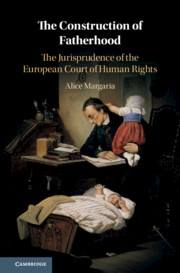Book contents
- The Construction of Fatherhood
- The Construction of Fatherhood
- Copyright page
- Dedication
- Contents
- Foreword
- Acknowledgements
- Introduction
- 1 Fatherhood and the Law in Europe
- 2 The ECtHR and Fatherhood: Limits and Potential
- 3 Fatherhood and Assisted Reproduction
- 4 Post-Separation and Unmarried Fatherhood
- 5 Fatherhood and Family–Work Reconciliation
- 6 Fatherhood and Homosexuality
- 7 Fatherhood at the ECtHR
- Bibliography
- Index
4 - Post-Separation and Unmarried Fatherhood
Published online by Cambridge University Press: 21 November 2019
- The Construction of Fatherhood
- The Construction of Fatherhood
- Copyright page
- Dedication
- Contents
- Foreword
- Acknowledgements
- Introduction
- 1 Fatherhood and the Law in Europe
- 2 The ECtHR and Fatherhood: Limits and Potential
- 3 Fatherhood and Assisted Reproduction
- 4 Post-Separation and Unmarried Fatherhood
- 5 Fatherhood and Family–Work Reconciliation
- 6 Fatherhood and Homosexuality
- 7 Fatherhood at the ECtHR
- Bibliography
- Index
Summary
In this chapter, the Court’s construction of fatherhood is examined in the contexts of post-separation and unmarried fatherhood. Marriage has long played a crucial function in connecting men to their children and, as a consequence, the father–child relationship has been conventionally understood as mediated by men’s relationships with women. In practical terms, men’s serial parenting is a clear illustration that fatherhood is seldom ‘practised in isolation’, but is rather correlated to their relationship with their partner as well as whether they live with their partner. Fathers tend to parent by household and, therefore, they are more likely to nurture the children they live with. Fatherhood has been traditionally perceived as part of a ‘package deal’, in which the father–child tie depends on the inter-parental relationship, also in the law. Marriage was and, to some extent, continues to be the institution through which the law confers a status on both men and children.
- Type
- Chapter
- Information
- The Construction of FatherhoodThe Jurisprudence of the European Court of Human Rights, pp. 72 - 108Publisher: Cambridge University PressPrint publication year: 2019



